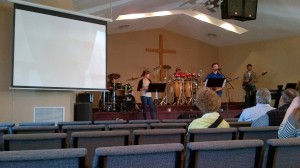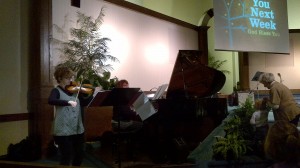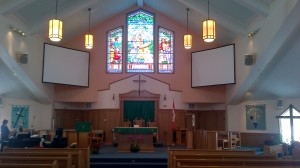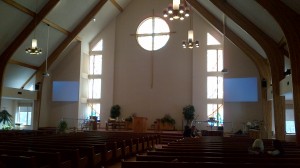St. Paul’s is another church at which I’m not really an outsider, as this is my local parish church.
So rather than talk about this particular congregation, I think this is a good time to share some of my thoughts and observations about Canadian Anglicanism in general.
I grew up in the Anglican church, and over the years I’ve come to recognize a number of key strengths that the denomination has.
Firstly, the Anglican church prides itself on being a ‘broad’ church. That is, it shelters a wide range of opinions and traditions under its umbrella. I’ve attended Evangelical Anglican churches, charismatic Anglican churches, Anglo-Catholic congregations, even an incredibly moving ‘Goth’ Eucharist at St. Edward’s in Cambridge.
Secondly, Anglicanism is a global church. The Anglican communion extends across the planet, with a particularly strong representation in Africa.
Thirdly, Anglicanism is a liturgical church. The prayer book provides a common structure that can be used in any language in a vast range of settings whilst keeping our worship centered on Christ.
Fourthly, and perhaps surprisingly, I’ve found it to a be an innovative denomination. Perhaps because the liturgy provides a solid foundation, it is possible to build all sorts of variations on top of it. The Alpha Course, which has been used to introduce over 15 million people to the basics of the Christian faith, was pioneered at an inner-city Anglican church in London.
At its best, I’ve also found Anglicanism to be a respectful church. I’ve had the privilege of watching the Church of England’s General Synod in session, while it was debating some politically and theologically contentious issues. In stark contrast to the atmosphere in the House of Commons, which meets just a few hundred yards away, I was very struck by the way that even those who held very strongly diverging views were able to engage with each other in a respectful and polite fashion.
But.
Having said all that, since emigrating to Canada, I have to admit that I’ve frequently found myself disappointed by the Canadian Anglican church, and I think that she has several critical weaknesses that must be addressed.
Firstly, like many immigrant churches, the Canadian Anglicans have too often seen themselves existing to preserve a certain cultural heritage. Anglicans have been described as ‘the Tory party at prayer’, and there is some truth to this accusation. If Canadian Anglicans see their raison d’être as protecting conservative English social values, they will miss their greater calling.
Secondly, I’ve noticed a lack of connectivity. In my childhood it was common for all the churches in the Diocese to come together at the cathedral for special occasions such as Easter, and for individual parishes to co-operate at a more local level. I’ve rarely seen this type of inter-church engagement in Ontario.
Ultimately, I worry that Canadian Anglicanism is suffering from an identity crisis. In a multicultural environment it can no longer content itself to be the ‘official’ church of English immigrants. With an aging demographic it seems unsure whether to continue to offer what is expected from an older generation or to attempt to awkwardly reach out to a younger one. And by trying to keep disparate groups of people happy, it runs the risk of losing sight of the key strengths that I’ve outlined above.
I feel that Canadian Anglicanism may be in the process of missing a great opportunity. There are an increasing number of people who don’t want to have religion spoon-fed to them with power-point slides and slick lecture-hall presentations. They have grown up with the ambiguities of a post-modern world, and are used to being surrounded by diversity of opinion and behaviour. They understand that the quest for truth can be complex and ambiguous. And they know that ultimately truth is experienced, not just taught.
To this emergent generation, the Anglican church could offer her global breadth and diversity, her experiential liturgy, her historical depth, her willingness to engage and wrestle with complex issues in a grace-filled and respectful environment.
She could. My question is – will she?







